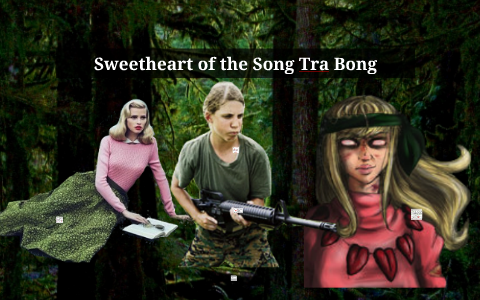According to author Tim O’Brien, one can dictate whether a war story is true or not by its lack of believability. He says that a true war story cannot be believed because some of the most unbearable parts are true, while the parts that you would believe are false. O’Brien claims that a true war story must be between the mad and the mundane.
The chapter, “Sweetheart of Song Tra Bong,” follows a story that is being told by Rat Kiley, a member of the Alpha Company. A quick summary of Kiley’s story goes:
Kiley explains his first assignment in the mountains of Chu Lai, where he and eight other men ran an aid station. The highest ranking officer, Eddie Diamond, jokes that the area is so isolated and safe that they could fly women into the camp. One man, Mark Fossie, takes this seriously and six weeks later his girlfriend Mary Anne Bell arrives. Mary Anne adjusts to the environment but starts to change. One night she goes missing. It is revealed that she was out all night on an ambush. She starts to change more and more and then she disappears. She returns six weeks later, but does not speak a word to Fossie, or the other seven men. Fossie, Kiley, and Diamond confront her in a hut. The three men find her singing with the head of a leopard on a post behind her, with the leopards skin dangling from the rafters. But the craziest part was that Mary Anne was wearing a necklace of human tongues. Four days later Kiley gets sent to join the Alpha Company, but he ran into Diamond about two months later and learned that Mary Anne “had crossed to the other side,” and was now “apart of the land.”
human tongues. Four days later Kiley gets sent to join the Alpha Company, but he ran into Diamond about two months later and learned that Mary Anne “had crossed to the other side,” and was now “apart of the land.”
So, based on O’Brien’s theory, is the story told by Rat Kiley a true war story? I would say yes. Most people probably would assume that there is no way that Kiley’s story is true, it’s so crazy, so how could you believe it? If you really consider what happened between Fossie, and Mary Anne, and the affects that war can have on people, this story changes from the unbelievable to believable. Fossie believes that if he keeps Mary Anne in the comfortable quarters that he and his men inhabit, Mary Anne would not be affected by her surroundings. But instead what happens is the opposite. As we read through the chapter we see Mary Anne take interest in many things, including: the language and everyday lives of the locals, ammunition, the procedures the men of the camp must go through. She helps with aiding the injured who are flown in, and she takes interest in the all night ambushes. Over all she takes in the nature of war. Fossie ignores the Vietnamese culture around him, while Mary Anne fully embraces it. Her passion of this culture is what changes her from the innocent girl she was when she arrived, to this being who now lives among the land. So, as I said before, I do believe this story, because if you really look into the most out there parts of the story, they eventually don’t seem so crazy. But does this story fit between the mad and the mundane? I believe that it does. It’s not so unbelievable when thought is put into it, but it’s also not super normal and dull, because honestly who ships their girlfriend out to the Vietnam War with them?
So now I ask you to think about whether or not you think this story is true. Do you agree with O’Brien’s philosophy on how to determine if something is a true war story or not? If you do, how would you apply his theory to determine if Kiley’s story is the truth, or a lie. Lastly, answer O’Brien’s question. Does this story fit in between the mad and the mundane?
I thought this was a very good blog. I liked how you tied all the points into one and had a strong opinion to back up what you stated. I also think the way you talked about her changing depicted a good image in my mind and thought that was very very cool!! Keep up the good work!!
I don’t totally agree that the story is true, but I do believe a majority of it is true. I think when Rat Kiley talked about Mary Anne he might’ve exaggerated some details which made us see things more than what it actually was. However, I do believe that Mary Anne’s willingness to learn about Vietnam probably was one of the main causes which made her “one with the land”.